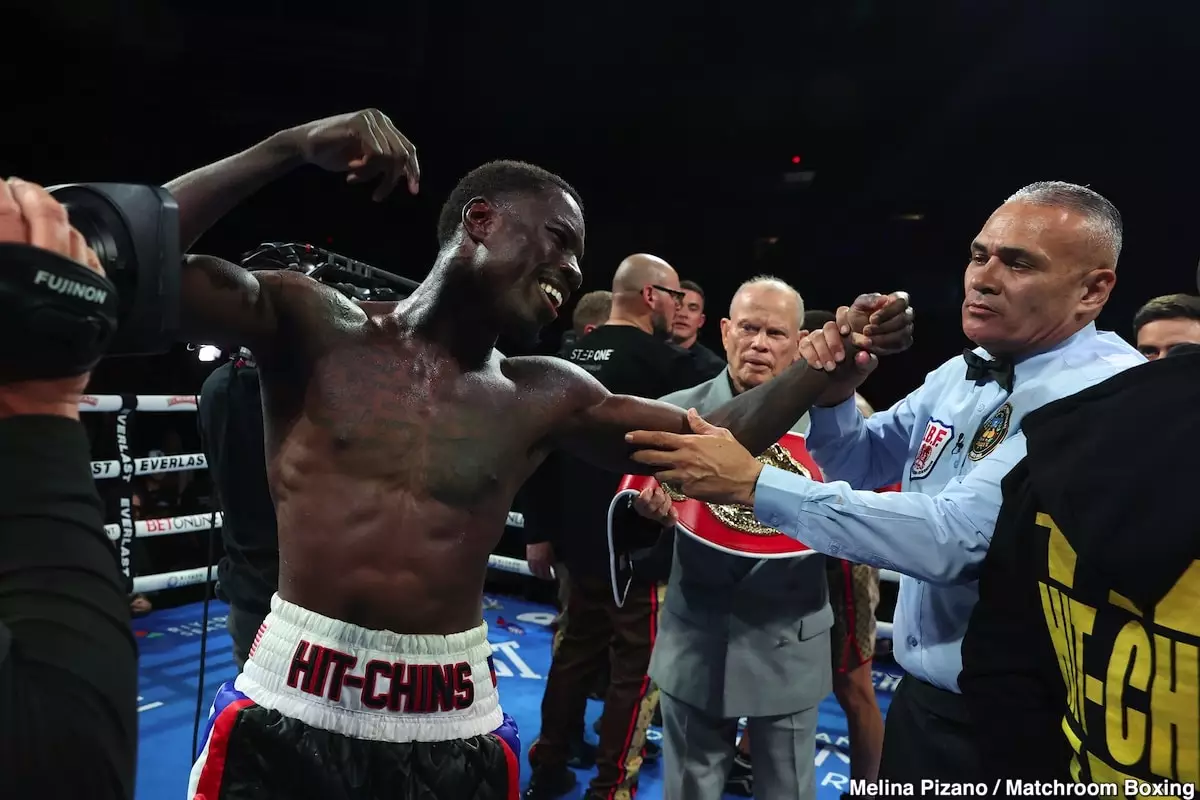The boxing landscape is witnessing a new contender on the rise—Richardson Hitchins, who recently claimed the IBF light welterweight title after a closely contested split decision against Liam Paro. The match took place at the Coliseo Roberto Clemente in San Juan, Puerto Rico, and marked a pivotal moment in Hitchins’ career. While his win was celebrated, it also illuminated the complexities surrounding future matchups in a sport often defined by its politics and negotiation hurdles.
Hitchins showcased not only his skills but also his adaptability in the ring, requiring four rounds to dissect Paro’s strategy before systematically assuming control of the fight. The boxing community has recognized that while this victory enhances Hitchins’ resume, it also challenges promoter Eddie Hearn to secure notable opponents for the newly crowned champion. Speculating on potential fights, Hearn named big names like Ryan Garcia, Devin Haney, and Teofimo Lopez, but the road to securing these matchups remains fraught with complications.
One of the major talking points following the bout was the contentious scoring: a judge’s 117-111 scorecard in favor of Paro raised eyebrows and raised questions about judging integrity in the sport. While two judges scored the fight for Hitchins at 116-112, the disparity in opinions emphasized the necessity for standardized judging and transparency within boxing. Hearn, Hitchins, and many analysts pointed out that consistent scoring could make or break a fighter’s career and the trust that fans place in the sport.
In addition to the dubious judging, there was a palpable sense of frustration expressed by Hitchins regarding the difficulty in securing high-profile fights. Despite holding a title, the prospect of drawing in elite opponents who view Hitchins as a formidable challenge adds a level of complexity to his aspirations. Hearn’s lukewarm post-fight reactions served as a reminder that titles do not guarantee opportunities; they often serve as barriers that more established fighters may prefer to avoid.
Richardson Hitchins entered the championship fight with a significant degree of preparation, praising Paro’s craftiness and adaptability. Interestingly, the evolution of Paro’s tactics highlighted how champions often enter fights with dramatically altered game plans, which may not always yield favorable results. Hitchins noted, “It was like I was boxing a young guy… you have to have a lot of skills and experience to box a guy like that.” This analysis of the fight underscores Hitchins’ own growth and readiness to face various fighting styles.
However, the path forward for Hitchins is lined with uncertainties. While he gained recognition and a title, the skepticism about his potential matchups looms large. His comments about possibly facing someone like Jack Catterall reflect his readiness to engage with fighters outside the limelight, potentially leading to further bouts that could enhance his reputation and marketability.
Eddie Hearn has certainly played a vital role in Hitchins’ rise but faces substantial hurdles in promoting him effectively. The boxing promoter emphasized the importance of Hitchins’ title, stating it provides the leverage needed to entice other fighters into the ring. However, whether this leverage translates into signed fights remains questionable.
Hearn’s assertion that showcasing the championship caliber of Hitchins will persuade others to step up is optimistic at best. The boxing sphere has a history of top fighters avoiding clashes with challenging opponents—especially emerging talents. The fear of losing can drive established champions to prioritize safer, less risky options, making the idea of matching up with someone like Hitchins a daunting proposition.
Looking to the Future
In an environment where money often dictates matchups over merit, the future for Richardson Hitchins hangs in a delicate balance. With every victory, he cements his place in the boxing scene, yet the skepticism surrounding the fight landscape remains a significant barrier. While Teofimo Lopez’s eagerness to approach Hitchins might signal potential interest, there’s a sense that such openness could be more about publicity than genuine willingness to embrace risk.
As Hitchins continues his career, the upcoming months may prove crucial. Whether he becomes a household name in boxing or remains on the sidelines as fights elude him will depend not only on his performance in the ring but also on Hearn’s capability to navigate the competitive waters that define the sport today. Ultimately, the boxing community will be watching closely to see if the talent and tenacity of Richardson Hitchins can indeed translate into meaningful opportunities moving forward.

